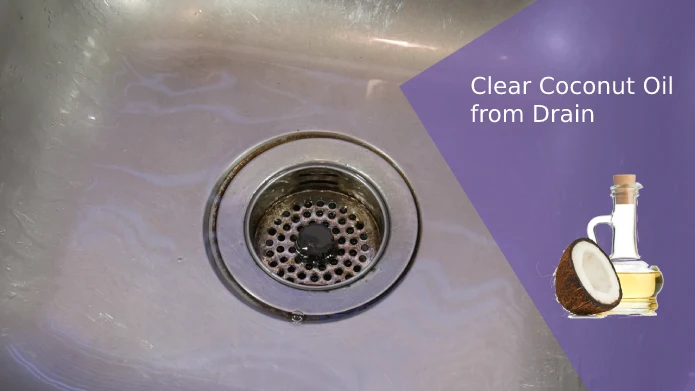Last Updated on August 28, 2023
Coconut oil has been gaining popularity as a versatile ingredient in multiple areas, from cooking and baking to beauty products. While it holds many benefits, caution should be taken when miscuing or spilling the substance as it can lead to clogged drains. Now the fact is how to clear coconut oil from a drain?
There are several ways to clear coconut oil from the drain effectively. The hot boiling water and baking soda treatment, dish soap treatment, vinegar, and baking soda treatment, and drain cleaner solution treatment are all methods that can help you get rid of those stubborn blockages.
So if you’ve been dealing with this issue for quite some time and want to learn more about clearing coconut oil from your drain, keep reading. In the following sections, we will discuss each of these techniques and their pros and cons so that you can choose the right one for your needs.
How to Clear Coconut Oil from the Drain: DIY Methods
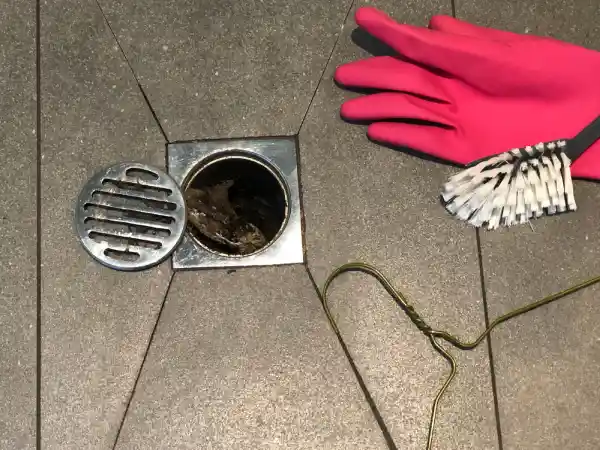
Clearing coconut oil from the drain may seem daunting, but with the right processes and knowledge, it can be done quickly and easily. Keep following the steps of each process below to get your drain back in business:
No 01: Boiling Water and Baking Soda Treatment
Combining hot boiling water and baking soda is a simple yet effective way to clear a clogged drain caused by coconut oil.
Start off by pouring 1/2 cup of baking soda down the drain, followed by 1/2 cup of hot boiling water. Wait 15 minutes for the mixture to settle, then flush the drain with cold running water for one minute.
The baking soda will create an alkaline solution that can help break down the fatty acids found in coconut oil that is causing the clog. This method is best suited for minor clogs located close to the sink or shower head, as it does not require any special tools or chemicals.
Pros: One significant advantage of this method is its simplicity. All you need are two common household ingredients and some patience. It’s also reasonably inexpensive, as baking soda is always readily available at local stores.
Also, it can be used on almost any type of drain clog, so it’s an excellent all-purpose remedy for blocked pipes.
Cons: On the downside, this treatment won’t work on deep or stubborn clogs far away from your sink or shower head. Also, hot boiling water can cause plastic pipes to corrode over time if used excessively. This makes it less ideal for frequent clogs that require multiple treatments over several months or years.
Lastly, while baking soda is generally safe for children and pets, improper handling could result in burns due to its high temperature and acidic nature when mixed with water.
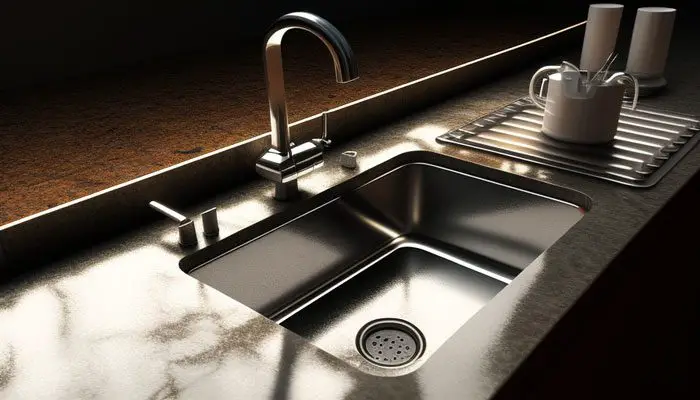
No 02: Dish Soap Treatment
This is another excellent way to clear coconut oil from your drains without using harsh chemicals or purchasing expensive tools such as plumbing snakes or augers.
To begin, pour 1/2 cup of dish soap (preferably liquid) into the affected drain, followed by 1 gallon of boiling water. Give it 10 minutes before flushing it out under cold running water for one minute straight.
The dish soap works by breaking up surface tension between elements within the coconut oil molecules and diluting them, which allows them to flow freely through your plumbing system. It essentially makes them easier to flush away thoroughly.
Pros: Using dish soap to unclog pipes and drains is a user-friendly way of tackling stubborn plumbing issues without needing advanced tools or dangerous chemicals.
Not only is it safe for your family, but its detergent properties make it great for cutting through grease traps and fats like coconut oil. For these reasons, dish soap has become an invaluable asset in any DIY plumber’s arsenal.
Cons: Despite being an effective home remedy for minor clogs, dish soap treatment may not be the most reliable solution when tackling difficult blockages caused by hardened fat in your pipes.
And if used regularly over time, it can leave behind a buildup that could eventually result in further congestion problems. Using this technique multiple times makes caution key.
No 03: Vinegar and Baking Soda Treatment
It is a practical, simple, and inexpensive way to dislodge stubborn oil from your plumbing system.
The first step in this process is to pour a cup of baking soda into the drain. Once the baking soda has been poured in, it should be followed with a cup of white vinegar. The combination of these two ingredients will create a fizzing reaction that will help break down the coconut oil that is blocking the pipes.
After about 10 minutes have passed, you can then fill up your sink with hot water and flush out any remaining debris from the pipe.
Pros: Advantages of this method include its simplicity and affordability. All you need are essential household items in most kitchens, making them easy to access in just about any home environment. It’s also highly effective at removing blockages without requiring special tools or supplies.
And its natural components mean it is safe for humans and the environment. Unlike harsher chemicals like drain cleaners that can contain toxic ingredients. Lastly, this method will not damage your plumbing system due to its gentler approach than other methods.
Cons: While this method is usually effective in 10 to 15 minutes, some more challenging blockages caused by grease deposits may require more advanced solutions such as chemicals or professional plumbers.
Be aware that using home remedies for septic tanks is not recommended since the combination of acids from vinegar could be detrimental to essential bacteria present inside them.
No 04: Drain Cleaner Solution Treatment
The drain cleaner or chemical solution treatment is the most effective option for clearing coconut oil from blocked drains and pipes caused by coconut oil buildup. This method involves using commercial-grade cleaning products made specifically for unclogging drains. It typically contains sodium hydroxide (caustic soda) and potassium hydroxide (caustic potash).
Pour one liter of warm water into the drain, followed by 1/2 liter of drain cleaner solution while wearing protective gloves. Handling these solutions carefully is important since they’re acidic and can burn your skin. Allow it to sit for 30 minutes before flushing out any remaining residue with hot water.
Pros: This method is incredibly powerful in tough clog blockages caused by any type of oil. It quickly slices through thick layers of hardened oil with ease, leaving manual methods such as plunging and snaking in the dust.
You won’t have to spend hours unplugging your pipes anymore. And because these solutions come pre-packaged, there’s no mess involved.
Cons: Using chemical drain cleaners can be hazardous, and care should always be taken when using them, as their caustic nature makes them toxic. They also tend to cost more than DIY solutions such as vinegar/baking soda mixtures.
Also, be careful when disposing of unused portions, as improper disposal could pollute local waterways, negatively affecting aquatic life.
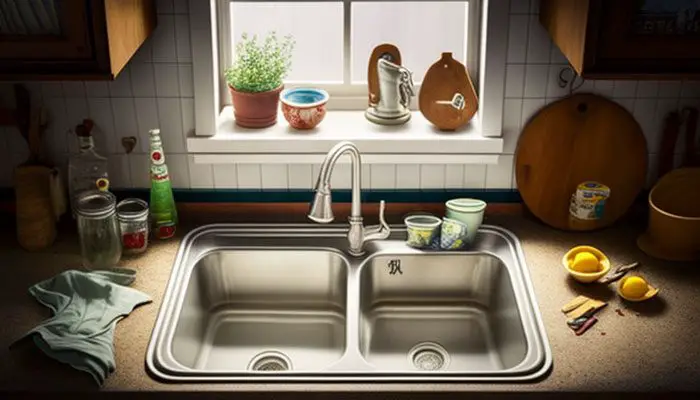
If you’re looking for an alternative to commercial drain cleaners, try these natural solutions. They may not be quite as effective, but they are certainly worth considering:
1. Industrial-Strength Liquid Drain Cleaner
This liquid drain cleaner is specially formulated to quickly and effectively cut through the toughest clogs and blockages.
It contains powerful, effective ingredients that are proven to dissolve oil, grease, hair, soap scum, paper towels, and other organic materials. This non-corrosive cleaner can be used on metal and plastic pipes for optimal performance.
2. Liquid Hair Drain Clog Remover & Cleaner
This cleaner is designed to break down rigid organic materials like oils, hairs, and soap scum that can build up in your drains over time.
It uses powerful enzymes to break through accumulated debris without damaging pipes or fixtures. The biodegradable formula won’t harm your skin or the environment while eliminating stubborn clogs fast and easily.
3. Enzyme Drain Cleaner for Clog Remover
This enzyme drain cleaner is an all-natural solution for clearing out clogged drains caused by oils, fats, grease buildup, paper products, food particles, and other organic matter.
Its unique blend of natural enzymes breaks down the material quickly for fast results with minimal effort on your part. Because it doesn’t damage pipes like harsh chemicals, you can use it regularly for clean drains.
4. Grease Trap Cleaner Treatment
This cleaner treatment is designed to keep your kitchen’s grease traps free from debris and running smoothly even with heavy use from commercial kitchens. The liquid formula quickly breaks down cooked fats, oils, greases, and solids using natural enzymes that are non-toxic to humans and the environment.
It works on most types of grease traps, including concrete sump pits as well as plastic interceptors, so you can keep them running efficiently all year long.
Why Does Coconut Oil Not Dissolve In Water?
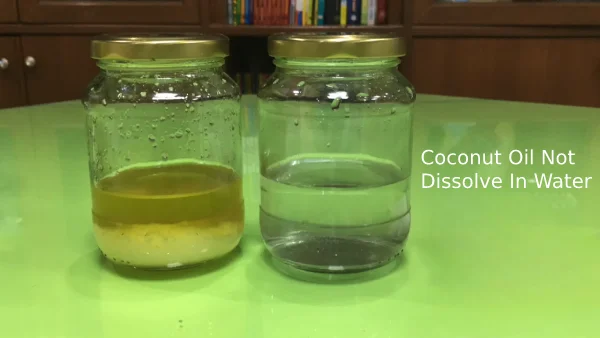
Coconut oil is a hydrophobic substance, meaning it does not mix with water. This is because coconut oil consists of non-polar molecules. These molecules cannot form hydrogen bonds with the polar molecules found in water, so they remain separate. This means that the two substances can’t mix and dissolve.
This can cause problems when cleaning drains, as the oils will not be able to break down and move through pipes as other liquids would. Instead, they will accumulate on the sides of pipes and eventually create blockages as they solidify.
Does Coconut Oil Ruin Drain Pipes?
Unfortunately, for many homeowners, the answer is yes. When left unchecked, coconut oil can have particularly devastating consequences for drain pipes. This is because coconut oil has a low melting point of around 25 degrees Celsius (78 degrees Fahrenheit).
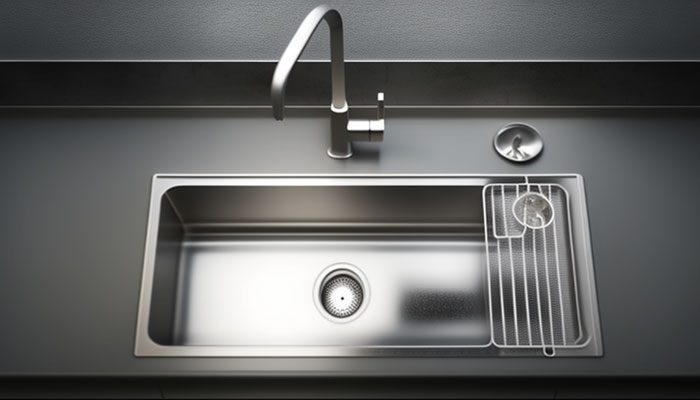
In warm environments (such as those found inside households), when heated up by hot running water, the liquid oil will melt and accumulate inside pipes over time. As more and more layers build up on the pipe walls over extended periods, these layers can eventually harden into tough blockages large enough to clog your pipes entirely.
How Do I Prevent Future Clogs Due To Coconut Oil Buildup?
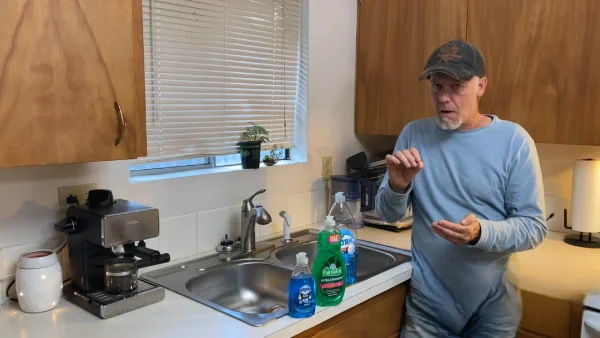
Preventing future clogs due to buildup caused by coconut oils can be achieved with a few simple precautions.
- Never pour melted or hot coconut oils down your drain. Allow them to cool before disposing of them properly. In this way, they are less likely to form blockages inside your pipes.
- After using coconut oils in your bath, shower, or kitchen sink, run hot water down your drain for at least 30 seconds afterward to help flush away any remaining traces. This reduces the possibility of larger deposits forming within your plumbing system.
- Use a drain stopper when washing dishes containing fat-based products like butter or margarine. This helps catch any fatty residue before it can go down the drain.
Unclog Coconut Oil-Clogged Pipes Quickly
Clearing coconut oil from the drains does not have to be an arduous task. Though it may seem like a complex problem to solve at first glance, using the advice outlined in this blog post will ensure that your pipes remain clear.
Whether you use boiling water and baking soda, dish soap, vinegar or a drain cleaner solution treatment, any options should help you unclog your pipes quickly and easily.
So don’t be intimidated by those annoying blockages caused by coconut oil. With our helpful guide, you’ll have them cleared up in no time.

